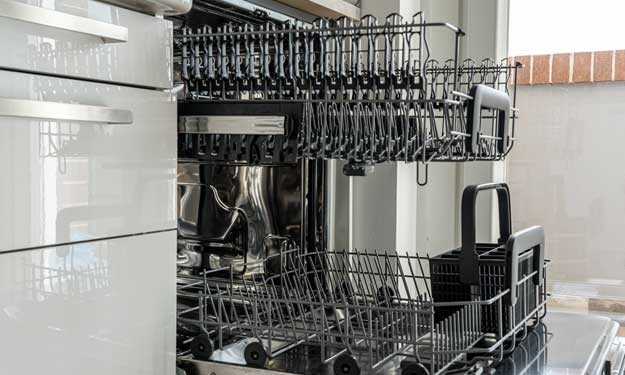Tips for Using Automatic Dishwashers

How to Effectively Clean and Use the Dishwasher.
Tips for Using the Dishwasher
With today’s fast-paced lifestyles and homes where most adults work (either away from home or in home offices), automatic dishwashers are a necessity.
Dishwashers are still deficient in unloading and loading itself. That is one feature I’d love to see!
If your dishwasher is not getting the job done with cleaning the dishes, we can help you figure it out.
How Automatic Dishwashers Clean Dishes
The power of the dishwasher itself, in forcing the water through the spray arms and water ports, produces the actual scrubbing action that ultimately provides the essential cleaning and sanitizing you expect when washing dishes.
Contrary to popular belief, dishwashers do their job with a minimal amount of water. It does not fill up to the brim. If it did, you’d have a flood every time you popped open the door during the cleaning cycle.
It simply fills and expels water several times during a cycle to efficiently wash and clean your dishes. An ordinary cycles uses between 6-10 gallons of water.
Washing Dishes in the Dishwasher
Gels for dishwashing detergents are commonly used but may not be the right choice. Many contain bleach which degrades the inner rubber seals.
Gel detergents are hard to rinse off and don’t always work well if you have hard water. If my cleaning tips do not help you, it could be caused by using a gel detergent. Try using a powdered detergent instead and follow some simple tips:
- Always use hot water. The water temperature should reach 130 degrees. This is needed to dissolve the soap, remove grease and sterilize the dishes and it can reduce drying time.
- If you have hard water, fill both detergent cups in your dishwasher.
- A rinse agent will help to remove hard water spots.
- If you have hard water build up, use a hard water cleaner regularly to remove the minerals from the inside.
- Every two months, clean your dishwasher by adding 2 cups of vinegar to a washing cycle that has no dishes in it.
- To get the most out of clean dishware be sure to scrap off food debris.
If Your Dishwasher Is Not Cleaning Well
It’s not always the dishwashers fault if dishes come out dirty. There are several things that factor into having a dishwasher that cleans dishes well.
The job description of a dishwasher is to agitate hot water while dissolving a cleaning detergent and causing it to continuously flush the contents of the tub, removing food particles from the dishes, then expelling the contaminated detergent solution.
It refills with clean hot water, repeats flushing and rinsing the dishes, expels the rinse water, then begins and completes a drying cycle.
The Importance of Hot Water
Even common water becomes a critical ingredient in dish washing. It needs to be hot enough to dissolve the detergent and then become the “carrier” to wet and clean the dirty dishes.
Then clean, fresh, hot water must flush remaining soil and detergent from the surface of the dishes, glassware, tableware, and cookware, making them fresh and clean and palatable to the user.
You should always use the hottest water available – ideally at 130°F or 54.4°C. Hot water is important in washing away grease and other oily food.
Proper Loading of Dishes
Dirty dishes can be caused by improper loading. My kids are terrible at loading the dishwasher and try to stuff everything into it so they don’t have to wash dishes by hand or do a second load.
Pots, pans, bowls and utensils can block the water spray which will result in improper cleaning.
Run a test and start the dishwasher when you think it’s about half full. If your dishes come out clean, then it’s likely being over filled or not loaded correctly.
Hard Water / Water Spots
“Hard water” is hard on automatic dishwashers. If you have hard water, it’s difficult to get good suds from your soap or detergent.
Hardness of water is caused by minerals naturally present in the waster. Hard water causes spots and film on your dishes, crystal and glassware.
A rinse agent added to the dishwasher before cleaning will make the water “softer” resulting in cleaner dishes and less water spots.
Cloudy Glass
Crystal should not be washed in the dishwasher. That’s a plain fact, and if your crystal is cloudy it’s been etched by the high alkalinity of the dishwasher detergent. The damage is permanent.
Glass can become cloudy due to hard water deposits. If this happens to you try soaking a glass in straight vinegar for about five minutes. If the cloudiness is gone, then the problem is “hard water”, a result of minerals naturally present in water.
To fix this, add approx 50 percent more detergent to the dishwasher when using. If this does not help, add 1 Tablespoon baking soda to each load to “soften” the water. Baking soda is safe, and is a natural deodorizer too.
A rinse agent will also soften the water, reducing hard water spots and clouding.
When to Avoid Using the Dishwasher
So many appliances can now be taken apart and pieces can be washed in the dishwasher. This is much more convenient, but there are times when you should avoid washing parts in the dishwasher.
Food processors often have plastic containers that are technically dishwasher-safe, but a lot of times the plastic gets discolored and cracks much more easily. Also, the blades from food processors can be bent and dulled in the dishwasher, so you should avoid washing them that way.
Metal pieces from mixers or handheld can openers can clash with other things in the dishwasher, the coating will peel, and they will eventually rust. Washing them in the dishwasher once in a while is OK, but the most of the time, just use soapy water in the sink.

